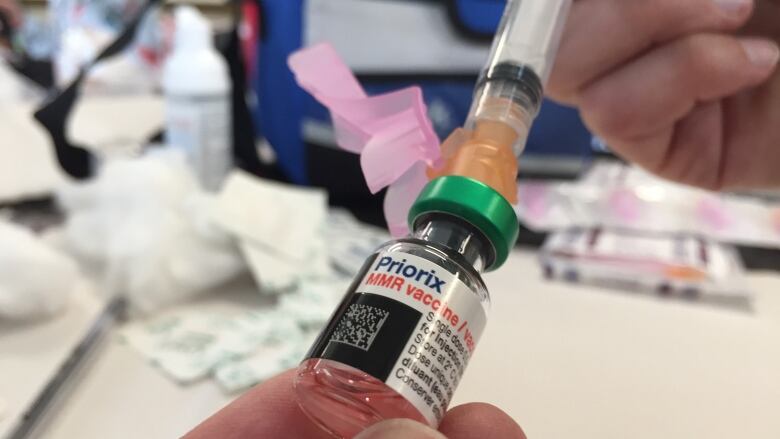What to do if you have lost your vaccination records
Measles outbreak in New Brunswick has public health officials asking people to update their shots

A shortage of the measles vaccine should be coming to an end, says Nova Scotia's public health department, which continues to advise people to make sure they've had their shots.
There was a national shortage of the shot for measles, mumps and rubella (MMR) because of a manufacturing problem.
At the same time, demand grew as 12 measles cases were confirmed in an ongoing outbreak in Saint John.
The public health department says orders are now arriving and any clinics that don't have it in stock at the moment, should have it shortly.
It's not just children who need the shots. Those born in the 1970s and 1980s are asked to check with their doctor to see if they need a booster. That generation was given just one dose of the vaccine instead of two, which gives people immunity for life.
Those born before 1970 are considered to be immune because they were likely exposed to the contagious disease when they were young.

But what happens if you've lost track of that booklet that tracks your vaccination records? CBC News put that question to Dr. Gaynor Watson-Creed, the deputy chief medical officer of health in Nova Scotia. Here's what she recommends:
Start with your doctor or nurse practitioner
"Just calling their office or going in for an appointment to get your vaccine record can be a simple thing to do," said Watson-Creed.
If you have had the same primary-care provider for a long time, they might have copies of your records. Of course, it's not that easy for many people in Nova Scotia who are currently without a physician.
Call your local public health office
Doctors and nurses send your immunization records to public health, so you may be able to track them down there.
There's an app for that
Watson-Creed recommends people use apps such as CANImmunize, which uses your age and location to tell you which shots were standard while you were growing up. People can set up profiles for each member of their family, and start actively tracking their shots moving forward.
"The apps are synchronized with all the provincial and territorial vaccination schedules," she said. "It takes a lot of the guesswork out and a lot of the thinking work out around 'What do I need and when do I need it?' All of it is right there on your phone when you need it for you and your family members."
Get a blood test
There is an option for a blood test to see if you have immunities, but Watson-Creed emphasizes this is used as a last resort.
"Often it's simpler just to give somebody the extra dose of vaccine, if we think that they're deficient in one or more doses," she said.
Back to the doctor or nurse practitioner
Unlike the flu shot, you can't get the MMR vaccine by dropping into your local pharmacy. Watson-Creed recommends you visit your primary health-care provider, or a walk-in clinic to get the booster if you have any doubts about whether you're immune.
It appears people are following that advice. Earlier this month, Dr. Paul Young told CBC News he's seen a significant increase in the number of people visiting his walk-in clinic to get the vaccine.